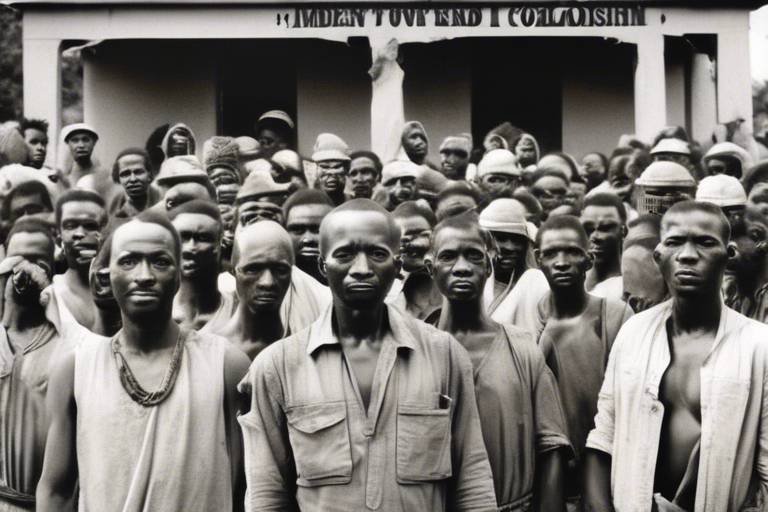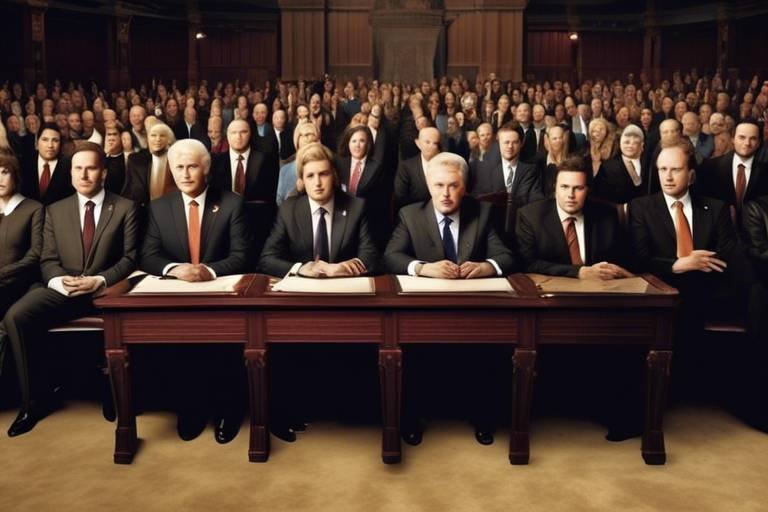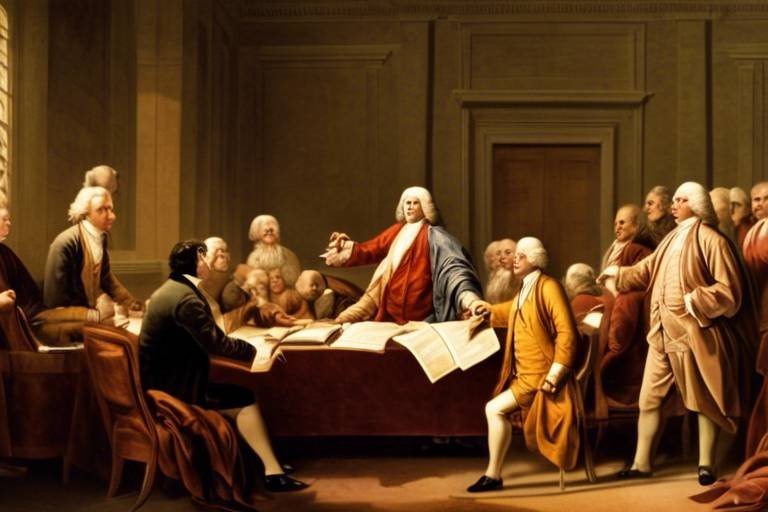The Philosophy of Colonialism and its Political Effects
The philosophy of colonialism is a complex web of ideologies and justifications that have shaped the world as we know it. From the moment European powers set sail to conquer distant lands, the underlying philosophies of superiority and civilization became the driving forces behind colonial expansion. This article explores these intricate philosophical underpinnings and their enduring political consequences, revealing how they transformed societies and influenced governance across the globe.
To truly understand the philosophy of colonialism, one must first delve into its historical context. The Age of Exploration, which began in the late 15th century, marked a significant shift in global dynamics. European nations, fueled by a desire for wealth and power, embarked on expeditions that led to the discovery of new territories. This era was characterized by key events such as the Spanish conquest of the Aztec Empire and the British colonization of India. These events were not merely conquests; they were rooted in ideologies that justified the subjugation of entire cultures. The belief in a 'civilizing mission' became a popular narrative, suggesting that colonizers had a moral obligation to bring 'civilization' to the 'savage' lands they encountered. Such ideologies laid the groundwork for the political structures that would emerge in these colonized nations.
At the heart of colonialism lies a series of philosophical theories that provided justifications for its practices. Central to these theories is the notion of superiority—both cultural and racial. Colonizers often viewed themselves as bearers of enlightenment, believing that their way of life was not only superior but also a gift to the 'less fortunate' peoples they encountered. This paternalistic attitude created a framework where colonizers felt justified in their actions, leading to significant moral and ethical dilemmas.
The role of racial theories in colonial justification cannot be overstated. The emergence of scientific racism in the 19th century provided a pseudo-intellectual basis for the belief in racial hierarchies. Colonizers used these theories to legitimize their domination, arguing that certain races were inherently superior to others. This ideology not only justified the exploitation of colonized peoples but also led to systemic discrimination that persists to this day. The ramifications of these beliefs were profound, shaping laws, social structures, and even international relations.
The imposition of colonial ideologies had devastating effects on indigenous cultures. The forced assimilation of native populations often led to cultural erasure, where traditional practices, languages, and beliefs were systematically suppressed. For example, in many parts of Africa and the Americas, colonial powers imposed their own educational systems, which marginalized indigenous knowledge and practices. This cultural transformation was not merely a side effect of colonialism; it was a central aim, as colonizers sought to reshape societies in their own image. The scars of this cultural genocide are still felt today, as many indigenous communities struggle to reclaim their identities.
Despite the overwhelming oppression, indigenous peoples exhibited remarkable resilience. Resistance took many forms, from armed uprisings to subtle acts of defiance. In India, figures like Mahatma Gandhi emerged, advocating for peaceful resistance against British rule. In other regions, traditional practices were adapted to maintain cultural identity while navigating the harsh realities of colonial life. This blend of resistance and adaptation is a testament to the strength of indigenous cultures, which continue to thrive despite centuries of oppression.
The political landscape of colonized nations was profoundly altered by colonial rule. Governance structures were often imposed without regard for existing systems, leading to a legacy of instability and conflict. Colonial powers frequently prioritized their own interests over the needs of local populations, creating a disconnect that would have lasting implications. As a result, many newly independent nations faced significant challenges in establishing effective governance post-colonization. The political ramifications of colonialism are far-reaching, affecting everything from national borders to international relations.
As the 20th century progressed, decolonization movements began to gain momentum. These movements were fueled by a growing awareness of the injustices of colonial rule and a desire for self-determination. Philosophically, they were rooted in ideas of freedom, equality, and justice, challenging the very foundations of colonial ideologies. Leaders like Nelson Mandela and Ho Chi Minh became symbols of resistance, advocating for the rights of their people against oppressive regimes.
Nationalism emerged as a powerful force in the decolonization process. It galvanized communities and fostered a sense of shared identity among people who had been divided by colonial powers. Nationalist ideologies played a crucial role in uniting diverse groups under a common cause—independence from colonial rule. This quest for sovereignty was not merely about political power; it was about reclaiming cultural identity and dignity.
The legacy of colonialism continues to affect contemporary politics in profound ways. Many former colonies grapple with issues such as economic inequality, political instability, and social fragmentation, all of which can be traced back to colonial practices. The repercussions of these historical injustices are still visible in international relations, where former colonial powers often maintain a significant influence over their former colonies. Understanding this legacy is crucial for addressing the challenges faced by post-colonial nations today.
- What is colonialism? Colonialism is the practice of acquiring full or partial political control over another country, occupying it with settlers, and exploiting it economically.
- What were the main motivations behind colonialism? The primary motivations included economic gain, territorial expansion, and the belief in cultural superiority.
- How did colonialism affect indigenous cultures? Colonialism often led to cultural erasure, suppression of indigenous practices, and forced assimilation into colonial cultures.
- What are decolonization movements? Decolonization movements are efforts by colonized countries to gain independence and reclaim their cultural identity from colonial powers.
- What legacy does colonialism leave today? The legacy of colonialism includes ongoing economic disparities, political instability, and cultural fragmentation in many former colonies.

Historical Context of Colonialism
Understanding the historical backdrop of colonialism is essential for grasping its philosophical implications. The roots of colonialism can be traced back to the late 15th century when European powers embarked on a quest for new trade routes and resources. This era, often referred to as the Age of Exploration, saw explorers like Christopher Columbus and Vasco da Gama setting sail to discover new lands. However, what began as a search for wealth soon morphed into a relentless pursuit of dominance over foreign territories and peoples.
Colonialism was not merely a byproduct of economic ambition; it was also deeply intertwined with prevailing ideologies of the time. The Renaissance, which emphasized humanism and individualism, laid the groundwork for a worldview that justified the subjugation of other cultures. European nations, fueled by a sense of superiority and a belief in their civilizing mission, began to view non-European societies as primitive and in need of guidance. This paternalistic attitude was encapsulated in the notion of the "white man's burden," a phrase popularized by Rudyard Kipling, which suggested that it was the duty of Western nations to civilize the so-called 'savage' populations.
Throughout the 16th to the 19th centuries, various European powers, including Britain, France, Spain, and Portugal, expanded their empires across Africa, Asia, and the Americas. The table below highlights key events that marked the progression of colonialism:
| Year | Event | Impact |
|---|---|---|
| 1492 | Columbus reaches the Americas | Initiated European colonization of the New World |
| 1600 | Establishment of the British East India Company | Signified the beginning of British colonial rule in India |
| 1884-1885 | Berlin Conference | Partition of Africa among European powers |
| 1947 | India gains independence | Marked the beginning of decolonization movements |
Colonialism was often justified through a complex web of political, economic, and social narratives. The ideologies that emerged during this period not only shaped the actions of colonizers but also had profound repercussions on the colonized. For instance, the belief in racial superiority led to the establishment of discriminatory policies and practices that marginalized indigenous populations. This created a societal structure where the colonizers held power, while the local people were often relegated to the status of second-class citizens.
To further complicate matters, the impact of colonialism varied significantly across different regions. In some areas, colonial rule led to the extraction of resources and exploitation of labor, while in others, it resulted in the establishment of new governance structures that disrupted traditional systems. The resulting political landscape was often characterized by instability and conflict, as newly formed nations struggled to reconcile their colonial past with aspirations for self-determination.
As we delve deeper into the philosophical underpinnings of colonialism, it becomes clear that understanding its historical context is crucial. The ideologies that emerged during this time not only justified the actions of colonizers but also laid the groundwork for the political consequences that would unfold in the decades and centuries to come. So, how did these ideologies shape the societies they touched, and what lasting effects can we still see today? These questions will guide us as we explore the philosophical justifications for colonialism and its enduring legacy.
- What were the primary motivations for colonialism? The main motivations included economic gain, political power, and a belief in the superiority of Western civilization.
- How did colonialism affect indigenous cultures? Colonialism often led to cultural erasure, forced assimilation, and significant changes in social structures.
- What are the modern implications of colonialism? The legacy of colonialism continues to influence global politics, economic disparities, and social tensions in many former colonies.

Philosophical Underpinnings
The philosophy of colonialism is a complex tapestry woven from various ideological threads that justified the expansion of empires across the globe. At its core, colonialism was underpinned by a belief in the superiority of certain cultures and races over others. This notion was not merely a social attitude but was deeply embedded in the political and economic frameworks that propelled colonial powers to assert control over vast territories. The prevailing sentiment was that the colonizers had a moral obligation to "civilize" the so-called "savage" populations, a belief that was often couched in paternalistic rhetoric.
One of the most influential philosophical theories that emerged during the age of colonialism was Utilitarianism. Proponents believed that the greatest good for the greatest number justified the subjugation of smaller groups. This rationalization led to a widespread acceptance of the idea that colonization was not only beneficial but necessary for the progress of humanity. However, this perspective often ignored the voices and rights of the indigenous populations, treating them as mere obstacles in the path of progress.
Another significant philosophical underpinning was the concept of Social Darwinism, which misapplied Darwin's theories of evolution to justify racial hierarchies. This ideology posited that stronger nations had the right—and even the duty—to conquer weaker ones. The implications of this were profound, as it provided a pseudo-scientific rationale for the brutal practices of colonization, including forced labor, land seizure, and cultural assimilation. The belief in a natural order where some races were deemed superior only served to dehumanize those who were colonized.
The impact of these philosophical ideologies extended beyond just the practicalities of governance; they permeated the very fabric of society. The colonizers implemented policies that were designed to enforce their cultural norms, often dismissing indigenous practices and beliefs as primitive or inferior. This led to a profound cultural erasure, as local traditions were replaced or suppressed in favor of Western ideals. The consequences were devastating, resulting in the loss of languages, religions, and social structures that had existed for centuries.
However, it's essential to recognize that the imposition of colonial ideologies did not go unchallenged. Indigenous populations displayed remarkable resilience and adaptability, often blending their traditions with those imposed by colonizers. This resistance took many forms, from outright rebellion to subtle acts of defiance embedded within cultural practices. The interplay between oppression and adaptation highlights the dynamic nature of colonial encounters, revealing that while colonial ideologies sought to dominate, they also inadvertently sparked a rich tapestry of hybrid cultures.
In summary, the philosophical underpinnings of colonialism were complex and multifaceted, rooted in ideas of superiority and moral obligation. These ideologies not only justified the subjugation of vast populations but also led to significant changes in cultural landscapes and societal structures. Understanding these philosophical foundations is crucial for grasping the profound and lasting political effects that colonialism has had on the world.

Racial Theories and Justifications
Racial theories emerged as a powerful tool in the arsenal of colonial justifications, serving to rationalize the subjugation and exploitation of entire populations. These theories, often steeped in pseudo-science, painted a picture of a world divided by inherent racial hierarchies. Colonizers, buoyed by a belief in their own superiority, posited that they were on a divine mission to 'civilize' those they deemed 'inferior.' This mindset not only dehumanized the colonized but also provided a convenient framework for the systematic oppression they faced.
At the heart of these racial theories was the notion that certain races were biologically and intellectually superior to others. This belief was often supported by skewed interpretations of Darwinism, where the survival of the fittest was misapplied to justify the dominance of European powers. The idea that non-European societies were 'backward' or 'primitive' became a rallying cry for colonial expansion, allowing colonizers to dismiss the rich histories and cultures of indigenous peoples. Such ideologies were not merely academic; they were woven into the very fabric of colonial policy, influencing everything from governance to social structure.
To illustrate the impact of these racial justifications, consider the following table that outlines key racial theories and their implications during the colonial era:
| Theory | Proponent | Implications |
|---|---|---|
| Social Darwinism | Herbert Spencer | Justified imperialism as a natural order of evolution |
| Scientific Racism | Samuel Morton | Promoted the idea of cranial capacity as a measure of intelligence |
| White Man's Burden | Rudyard Kipling | Framed colonialism as a moral obligation to civilize 'lesser' races |
These theories not only justified the actions of colonizers but also created a social hierarchy that placed European settlers at the top, relegating indigenous populations to a status of inferiority. This hierarchy was often enforced through legal systems and educational policies that marginalized local cultures and languages, further embedding the colonial narrative. The consequences of such ideologies were devastating, leading to cultural erasure and the loss of identity for countless communities.
Moreover, the racial theories of colonialism had a long-lasting impact that can still be felt today. The stereotypes and prejudices birthed during this era have perpetuated cycles of discrimination and inequality, influencing contemporary social and political dynamics. The scars of colonialism run deep, and the struggle against these ingrained beliefs continues as societies seek to redefine their identities in the post-colonial world.
In conclusion, racial theories were not just abstract concepts; they were powerful justifications that fueled colonial expansion and oppression. Understanding these ideologies is crucial for grasping the full impact of colonialism on both historical and modern contexts.
- What are racial theories? Racial theories are ideologies that categorize people based on perceived racial differences, often asserting superiority of one race over others.
- How did racial theories justify colonialism? These theories provided a pseudo-scientific rationale for the domination and exploitation of colonized peoples, framing it as a moral obligation to civilize them.
- What are the long-term effects of these theories? The legacy of racial theories can still be seen today in ongoing discrimination, social inequalities, and the struggle for cultural identity among indigenous populations.

Impact on Indigenous Cultures
The impact of colonialism on indigenous cultures is a profound and often tragic aspect of history that echoes through time. When colonizers arrived on foreign shores, they brought with them not just their ambitions for land and resources, but a set of beliefs that deemed indigenous ways of life as inferior. This cultural imperialism led to a systematic erasure of native traditions, languages, and social structures. Imagine a vibrant tapestry, rich with colors and patterns, suddenly being covered with a dull, uniform cloth. That’s precisely what happened to many indigenous societies during this tumultuous period.
One of the most significant effects of colonialism was the disruption of social structures. Traditional governance systems, which had been in place for centuries, were often dismantled or replaced by foreign systems that did not resonate with the local populace. For instance, many indigenous communities had their own methods of conflict resolution and leadership, which were disregarded in favor of European models. This not only caused confusion but also led to a loss of identity and purpose among indigenous peoples.
Additionally, the introduction of new religions often aimed at converting indigenous populations had a profound effect. Many communities faced pressure to abandon their spiritual practices, which were deeply intertwined with their cultural identities. As a result, sacred sites were desecrated, and ancient rituals were either suppressed or transformed into something unrecognizable. The loss of these cultural practices is akin to losing a part of one’s soul; it leaves a void that is hard to fill.
Moreover, the imposition of foreign economic systems disrupted traditional ways of living. Indigenous peoples, who had thrived on sustainable practices and a deep connection to their land, were often forced into labor systems that exploited their resources and diminished their autonomy. The shift from communal land ownership to private property fundamentally altered their relationship with the land, leading to feelings of alienation and dispossession. This economic transformation can be likened to a tree being uprooted from its soil; it struggles to survive in an unfamiliar environment.
To illustrate the extensive impact of colonialism on indigenous cultures, consider the following table that summarizes key areas of cultural disruption:
| Aspect | Impact of Colonialism |
|---|---|
| Social Structures | Dismantling of traditional governance and community roles |
| Religion | Suppression of indigenous spiritual practices and beliefs |
| Economy | Shift from sustainable practices to exploitative labor systems |
| Language | Loss of native languages through assimilation policies |
| Identity | Fragmentation of cultural identity and community cohesion |
Despite these challenges, it is important to recognize the resilience of indigenous cultures. Many communities have fought to preserve their traditions and languages, often blending old practices with new influences to create a unique cultural identity that honors their heritage while adapting to modern realities. This resilience is a testament to the strength of indigenous peoples and their unwavering connection to their roots, much like a river that continues to flow despite the obstacles in its path.
In conclusion, the impact of colonialism on indigenous cultures is a complex tapestry woven with threads of loss, adaptation, and resilience. As we reflect on this history, it is crucial to acknowledge the ongoing struggles of indigenous peoples to reclaim their identities and cultural heritage in a world that often seeks to erase them. Understanding this impact is not just about looking back; it's about recognizing the importance of cultural diversity and the need to support indigenous rights today.
- What are some examples of indigenous cultures affected by colonialism? Many cultures, including Native American tribes in the United States, Aboriginal peoples in Australia, and various African tribes, have experienced significant disruption due to colonialism.
- How did colonialism affect indigenous languages? Colonialism often led to the suppression of indigenous languages, with many being replaced by the colonizers' languages, resulting in a loss of linguistic diversity.
- What efforts are being made to preserve indigenous cultures today? Various movements aim to revitalize indigenous languages, traditions, and governance systems, with increased support from both local and international organizations.

Resistance and Adaptation
Colonialism, with its oppressive structures and ideologies, often sought to erase the identities and cultures of indigenous peoples. However, history shows us that oppression can ignite a fierce spirit of resistance. Indigenous communities didn't simply roll over; they fought back in myriad ways, adapting their traditional practices to survive in a colonial world. This resistance wasn't always overt; sometimes it was a subtle yet powerful act of cultural preservation.
One of the most interesting aspects of this resistance is how indigenous peoples employed creativity and innovation to navigate the challenges posed by colonial rule. For instance, many tribes adapted their traditional governance structures to incorporate elements of colonial administration, creating hybrid systems that allowed them to maintain some degree of autonomy. This blending of old and new was a form of resilience, showcasing the ability of these cultures to evolve while holding onto their core values.
Moreover, cultural practices such as storytelling, music, and art became vital tools for maintaining a sense of identity. For many indigenous groups, these practices served as a means of resisting cultural erasure. By embedding their histories and struggles within their art, they not only preserved their heritage but also communicated their experiences to future generations. This form of resistance was not just about survival; it was a declaration of existence against the backdrop of colonial dominance.
Resistance also took on more organized forms. Across the globe, indigenous groups engaged in uprisings, protests, and negotiations. For example, the Indian Rebellion of 1857 and the Boxer Rebellion in China are notable instances where colonized peoples rose up against their oppressors. These movements were often fueled by a combination of cultural pride and a desire for self-determination. They highlighted the inherent contradictions in colonial ideologies that claimed to bring civilization while simultaneously oppressing and exploiting local populations.
Adaptation, on the other hand, was equally significant. Many indigenous communities found ways to incorporate colonial goods and technologies into their traditional lifestyles. This pragmatic approach allowed them to thrive in a changing environment. For instance, the introduction of new agricultural techniques and crops sometimes enhanced food security, enabling communities to sustain themselves despite the challenges posed by colonial rule.
In essence, the story of resistance and adaptation is one of survival and strength. It illustrates how indigenous peoples have continuously fought to reclaim their narratives, identities, and rights. The resilience demonstrated by these communities serves as a powerful reminder that even in the face of overwhelming odds, the human spirit can endure, adapt, and ultimately thrive.
- What are some examples of indigenous resistance to colonialism?
Examples include the Indian Rebellion of 1857 and the Boxer Rebellion in China, where indigenous groups rose up against colonial powers.
- How did indigenous cultures adapt to colonial rule?
Many adapted by integrating colonial goods and technologies into their traditional practices, allowing them to maintain their cultural identity while navigating new realities.
- What role did art and storytelling play in resistance?
Art and storytelling served as vital tools for cultural preservation and resistance, allowing indigenous peoples to communicate their histories and struggles.

Political Consequences of Colonialism
Colonialism has left an indelible mark on the political landscape of nations across the globe. When we examine the political consequences of colonialism, we see a complex tapestry woven with threads of power, governance, and identity. The imposition of colonial rule often resulted in the dismantling of indigenous governance structures, leading to a centralized authority that was often unresponsive to the needs of local populations. This abrupt shift not only altered the political dynamics but also created a legacy of instability and conflict that many nations still grapple with today.
One of the most profound changes brought about by colonialism was the introduction of foreign legal systems and administrative practices. These systems were often alien to the local populace, creating a disconnect between the governed and their rulers. For instance, traditional systems of governance that had existed for centuries were replaced with bureaucratic structures that prioritized the interests of the colonizers. This led to a loss of political agency for indigenous peoples, who found themselves marginalized within their own lands.
Furthermore, the colonial period often saw the creation of artificial borders that ignored ethnic, cultural, and linguistic realities. This disregard for local identities has had lasting repercussions, often resulting in ethnic tensions and conflicts that persist long after independence. For example, in Africa, the borders drawn by colonial powers have contributed to ongoing disputes and violence, as groups that were once cohesive communities found themselves divided by arbitrary lines.
Moreover, colonialism fostered a sense of dependency that many nations have struggled to overcome. Economies were structured to serve the interests of the colonizers, leading to an extractive model that prioritized resource extraction over sustainable development. This dependency created a cycle of underdevelopment that has continued to affect political stability and governance in many post-colonial states.
However, it's essential to recognize that colonialism also sparked movements for change. The oppressive political structures imposed by colonial powers ignited a desire for self-determination among colonized peoples. This desire often manifested in various forms of resistance, from armed uprisings to peaceful protests, ultimately leading to independence movements across the globe. The struggle for independence not only challenged colonial rule but also reshaped national identities and political ideologies.
In summary, the political consequences of colonialism are multifaceted and far-reaching. They encompass the dismantling of indigenous governance, the creation of artificial national boundaries, and the establishment of dependency that continues to affect political systems today. As we reflect on these impacts, it becomes clear that understanding the political legacy of colonialism is crucial for addressing the ongoing challenges faced by many nations in their quest for stability and self-governance.
- What are the main political consequences of colonialism? The main consequences include the dismantling of indigenous governance, the creation of artificial borders, and the establishment of dependency on colonial powers.
- How did colonialism affect indigenous cultures? Colonialism often led to cultural erasure and transformation, severely impacting indigenous identities and practices.
- What role did nationalism play in decolonization? Nationalism became a driving force in decolonization, shaping movements that sought independence from colonial powers.
- Are the effects of colonialism still felt today? Yes, the legacy of colonialism continues to influence modern governance, international relations, and social dynamics in many countries.

Decolonization Movements
The quest for independence and self-determination was not merely a reaction to colonial oppression; it was a profound movement rooted in the desire for identity, dignity, and autonomy. As colonial powers tightened their grip on various regions, the seeds of resistance began to sprout, fueled by a mix of cultural revival and political activism. This wave of decolonization, which swept through Asia, Africa, and the Caribbean in the mid-20th century, was characterized by a strong philosophical underpinning that called into question the legitimacy of colonial rule.
At the heart of these movements was a **deep-seated yearning for self-governance**. Many leaders emerged, inspired by the idea that nations should govern themselves, free from foreign domination. Figures such as Mahatma Gandhi in India, Kwame Nkrumah in Ghana, and Frantz Fanon in Algeria became icons of this struggle, advocating for the rights of their people and the reclamation of their cultural identities. Their philosophies often intertwined the concepts of nationalism and socialism, pushing for not just political independence but also social justice and economic equity.
One of the most striking elements of the decolonization movements was the **diverse tactics** employed by various groups. Some opted for peaceful protests and negotiations, while others resorted to armed struggle. The choice of strategy was often influenced by the specific historical and social contexts of each region. For instance, in India, the non-violent resistance led by Gandhi became a model for peaceful protest globally. Conversely, in Algeria, the violent struggle against French colonial rule highlighted the desperation and urgency felt by many colonized peoples.
| Region | Key Leaders | Strategies Used |
|---|---|---|
| India | Mahatma Gandhi | Non-violent protests, civil disobedience |
| Ghana | Kwame Nkrumah | Political activism, negotiations |
| Algeria | Frantz Fanon | Armed struggle, guerilla warfare |
| Vietnam | Ho Chi Minh | Military resistance, diplomatic efforts |
Moreover, these movements were not just about political change; they were also about **cultural revival and the reassertion of identity**. Many nations sought to reclaim their heritage, languages, and traditions that had been suppressed under colonial rule. This cultural renaissance played a crucial role in uniting people and fostering a sense of belonging and pride. The arts, literature, and education became powerful tools for expressing the aspirations of the colonized, helping to galvanize support for independence.
As the 20th century progressed, the momentum for decolonization grew stronger, leading to significant political changes. The formation of new nations and the establishment of governments that reflected the will of the people marked a turning point in global history. However, the journey was fraught with challenges. The legacies of colonialism left behind **complex socio-political landscapes** that many newly independent nations struggled to navigate. Ethnic tensions, economic dependency, and political instability were just a few of the hurdles that these nations faced in their quest for true independence.
In conclusion, the decolonization movements were not just a series of political upheavals; they were transformative events that reshaped the world. They challenged the very foundations of colonialism and laid the groundwork for a new global order. As we reflect on this history, it is essential to recognize the **enduring impact** of these movements on contemporary politics and society. The fight for self-determination continues in various forms today, reminding us that the quest for justice and equality is a timeless struggle.
- What were the main causes of decolonization movements?
Decolonization movements were primarily driven by the desire for self-determination, cultural revival, and opposition to colonial oppression. - Who were some key figures in the decolonization movements?
Prominent leaders included Mahatma Gandhi, Kwame Nkrumah, and Frantz Fanon, each advocating for independence through various strategies. - What impact did decolonization have on former colonies?
Decolonization led to the establishment of new nations, but many faced challenges such as political instability and economic dependency.

Influence of Nationalism
Nationalism emerged as a powerful force during the decolonization movements, acting as both a rallying cry and a guiding philosophy for many nations seeking independence. This fervent sense of national identity often stemmed from the shared experiences of oppression and a desire to reclaim cultural heritage that had been marginalized under colonial rule. The question arises: how did nationalism transform the political landscape of colonized nations? In essence, nationalism provided a framework through which individuals could unite, fostering solidarity among diverse groups that may have previously been divided by tribal, ethnic, or linguistic differences.
One of the fundamental aspects of nationalism is its ability to create a collective consciousness. This sense of belonging often manifested in various forms, from cultural revival movements to political activism. Nationalist leaders, such as Mahatma Gandhi in India or Kwame Nkrumah in Ghana, utilized the principles of nationalism to galvanize support for independence. They emphasized the importance of self-determination and sovereignty, urging their compatriots to envision a future free from foreign domination. The aspiration for a nation-state where people could govern themselves resonated deeply, sparking widespread movements that challenged colonial authority.
Moreover, nationalism played a crucial role in shaping the political ideologies of newly formed states. After gaining independence, many nations grappled with the challenge of defining their national identity while addressing the legacies left by colonial powers. This often led to the formation of political parties that embraced nationalist ideologies, advocating for policies that prioritized the needs and aspirations of their citizens. However, the influence of nationalism was not without its complexities. In some cases, it fostered exclusionary practices that marginalized minority groups within the newly independent states, leading to tensions that persist even today.
To illustrate the impact of nationalism on decolonization, consider the following table that highlights key nationalist movements and their leaders:
| Country | Leader | Movement | Year of Independence |
|---|---|---|---|
| India | Mahatma Gandhi | Indian National Congress | 1947 |
| Ghana | Kwame Nkrumah | Convention People's Party | 1957 |
| Algeria | Ahmed Ben Bella | National Liberation Front | 1962 |
| Vietnam | Ho Chi Minh | Viet Minh | 1945 |
The legacy of nationalism in the context of decolonization is multifaceted. While it undeniably fueled the fight for independence and self-determination, it also laid the groundwork for ongoing political struggles. The challenge remains for many nations to balance national pride with inclusivity, ensuring that the aspirations of all citizens are recognized and respected. As we reflect on the influence of nationalism, it becomes clear that this powerful ideology continues to shape the political dynamics of post-colonial societies, influencing everything from governance to international relations.
- What is nationalism? Nationalism is a political ideology that emphasizes the interests and culture of a particular nation, often advocating for self-governance and independence from colonial or foreign rule.
- How did nationalism contribute to decolonization? Nationalism provided a framework for collective identity and unity among oppressed peoples, motivating them to seek independence and self-determination against colonial powers.
- Can nationalism have negative effects? Yes, while nationalism can foster unity, it can also lead to exclusionary practices that marginalize minority groups within newly independent states.
- Who were some key nationalist leaders during decolonization? Prominent leaders included Mahatma Gandhi in India, Kwame Nkrumah in Ghana, Ahmed Ben Bella in Algeria, and Ho Chi Minh in Vietnam.

Legacy of Colonialism
The legacy of colonialism is a complex tapestry that continues to weave its way through the fabric of modern societies. It’s not just a chapter in history books; it’s a living, breathing entity that influences political, social, and economic landscapes across the globe. The remnants of colonial rule are evident in various facets of life, from the borders of nations to the languages spoken and even the governance structures in place today. But what does this legacy truly entail, and how does it manifest in contemporary society?
One of the most significant aspects of colonial legacy is the political fragmentation it has left behind. Many countries that gained independence from colonial powers found themselves grappling with borders that were drawn with little regard for ethnic, cultural, or historical realities. This has often led to ongoing conflicts and political instability. For example, the arbitrary borders established during the Scramble for Africa have resulted in numerous civil wars and ethnic tensions that persist to this day. These issues highlight the challenges of nation-building in post-colonial contexts, where the imposition of foreign governance structures often clashes with indigenous practices and beliefs.
Economically, the impact of colonialism is equally profound. Many formerly colonized nations continue to experience economic dependency on their former colonizers or other global powers. This dependency often manifests in the form of unequal trade relationships and exploitation of resources. For instance, countries rich in natural resources may find themselves unable to leverage their wealth for development due to historical agreements that favor foreign corporations. This economic legacy fosters a cycle of poverty and underdevelopment, making it challenging for nations to achieve true independence and self-sufficiency.
Furthermore, the cultural legacy of colonialism cannot be overlooked. The imposition of foreign languages, religions, and cultural practices often led to the erosion of indigenous identities. While some cultures have managed to resist this erasure, many others have been profoundly transformed. The result is a hybridization of cultures that can sometimes lead to a loss of authenticity and heritage. In contemporary society, this cultural legacy is visible in the prevalence of colonial languages in government and education, as well as the ongoing debates about cultural appropriation and representation.
To better understand the multifaceted legacy of colonialism, we can look at the following key areas:
- Political Structures: The governance models imposed during colonial times often persist, with many nations adopting Western-style democratic systems that may not align with local customs.
- Economic Dependency: Former colonies frequently find themselves in a cycle of dependency on foreign aid and investment, hindering their economic autonomy.
- Cultural Identity: The blending of colonial and indigenous cultures has resulted in unique identities, but also in the loss of traditional practices and languages.
In conclusion, the legacy of colonialism is not a relic of the past but a dynamic force that continues to shape the present. Understanding this legacy is crucial for addressing the challenges faced by post-colonial societies today. It compels us to engage in conversations about reparations, cultural preservation, and the importance of recognizing and valuing indigenous knowledge systems. Only by acknowledging and confronting this legacy can we hope to build a more equitable and just future for all.
What is the legacy of colonialism?
The legacy of colonialism refers to the lasting political, economic, and cultural impacts that colonial rule has on formerly colonized nations. This includes issues like political fragmentation, economic dependency, and cultural erasure.
How does colonialism affect modern governance?
Colonialism has left many countries with governance structures that reflect the interests of colonial powers rather than the needs of local populations, leading to ongoing political instability and conflict.
Can the effects of colonialism be reversed?
While it is challenging to completely reverse the effects of colonialism, acknowledging its legacy and implementing policies that promote self-determination and cultural preservation can help mitigate its impacts.
Frequently Asked Questions
- What are the main philosophical justifications for colonialism?
The philosophies that justified colonialism often revolved around notions of superiority and the belief in a civilizing mission. Colonial powers viewed themselves as bearers of progress, tasked with bringing ‘civilization’ to what they perceived as ‘backward’ societies. This mindset not only rationalized the subjugation of other cultures but also framed it as a moral obligation.
- How did colonialism impact indigenous cultures?
Colonialism had a profound and often devastating impact on indigenous cultures. The imposition of foreign ideologies led to cultural erasure, as traditional practices, languages, and beliefs were suppressed. Many indigenous peoples faced forced assimilation, resulting in the loss of their cultural identity, which has left lasting scars on their societies.
- What role did racial theories play in colonialism?
Racial theories were central to the justification of colonial practices. These theories posited a hierarchy among races, with colonizers often placing themselves at the top. Such beliefs were used to legitimize the exploitation and domination of colonized peoples, framing them as inferior and in need of guidance from their ‘superior’ counterparts.
- What were some forms of resistance against colonial rule?
Resistance to colonial rule came in many forms, from armed uprisings to cultural preservation efforts. Indigenous peoples often adapted their strategies to cope with oppression, employing both overt and covert methods to challenge colonial authority. This resilience showcased the strength of their cultures and their desire for self-determination.
- What are the political consequences of colonialism?
The political landscape of colonized nations was fundamentally altered by colonialism. New governance structures were imposed, often disregarding traditional systems. This led to power imbalances, political instability, and ongoing struggles for autonomy that many nations continue to face today.
- How did decolonization movements emerge?
Decolonization movements arose as a direct response to the oppression of colonial rule. These movements were driven by a desire for self-determination and were often fueled by nationalist ideologies that emphasized the importance of cultural identity and political sovereignty. Leaders and activists rallied their communities to reclaim their rights and assert their independence.
- What is the legacy of colonialism in contemporary politics?
The legacy of colonialism is still evident in today’s political landscape. Many former colonies grapple with the ramifications of colonial policies, which have shaped their governance, economic systems, and international relations. The ongoing effects of these historical injustices continue to influence discussions around equity, reparations, and cultural recognition.



















